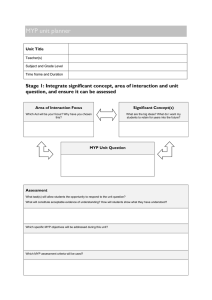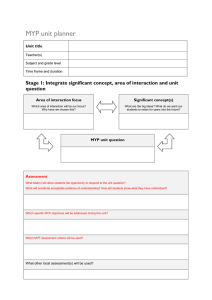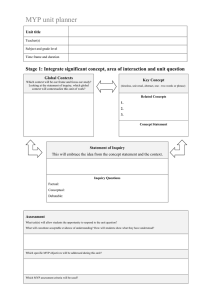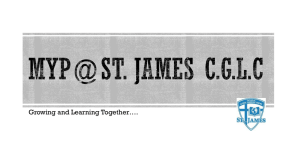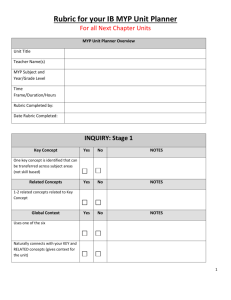The Middle Years Programme: - International Baccalaureate
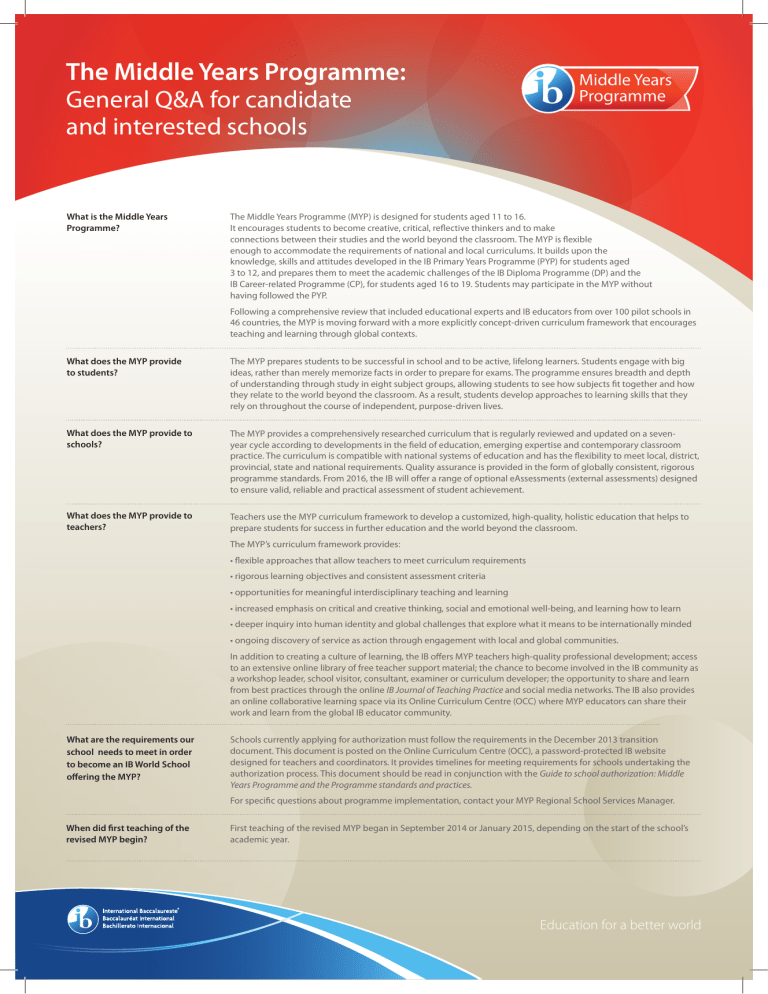
The Middle Years Programme:
General Q&A for candidate and interested schools
What is the Middle Years
Programme?
What does the MYP provide to students?
What does the MYP provide to schools?
What does the MYP provide to teachers?
What are the requirements our school needs to meet in order to become an IB World School offering the MYP?
When did first teaching of the revised MYP begin?
The Middle Years Programme (MYP) is designed for students aged 11 to 16.
It encourages students to become creative, critical, reflective thinkers and to make connections between their studies and the world beyond the classroom. The MYP is flexible enough to accommodate the requirements of national and local curriculums. It builds upon the knowledge, skills and attitudes developed in the IB Primary Years Programme (PYP) for students aged
3 to 12, and prepares them to meet the academic challenges of the IB Diploma Programme (DP) and the
IB Career-related Programme (CP), for students aged 16 to 19. Students may participate in the MYP without having followed the PYP.
Following a comprehensive review that included educational experts and IB educators from over 100 pilot schools in
46 countries, the MYP is moving forward with a more explicitly concept-driven curriculum framework that encourages teaching and learning through global contexts.
The MYP prepares students to be successful in school and to be active, lifelong learners. Students engage with big ideas, rather than merely memorize facts in order to prepare for exams. The programme ensures breadth and depth of understanding through study in eight subject groups, allowing students to see how subjects fit together and how they relate to the world beyond the classroom. As a result, students develop approaches to learning skills that they rely on throughout the course of independent, purpose-driven lives.
The MYP provides a comprehensively researched curriculum that is regularly reviewed and updated on a sevenyear cycle according to developments in the field of education, emerging expertise and contemporary classroom practice. The curriculum is compatible with national systems of education and has the flexibility to meet local, district, provincial, state and national requirements. Quality assurance is provided in the form of globally consistent, rigorous programme standards. From 2016, the IB will offer a range of optional eAssessments (external assessments) designed to ensure valid, reliable and practical assessment of student achievement.
Teachers use the MYP curriculum framework to develop a customized, high-quality, holistic education that helps to prepare students for success in further education and the world beyond the classroom.
The MYP’s curriculum framework provides:
• flexible approaches that allow teachers to meet curriculum requirements
• rigorous learning objectives and consistent assessment criteria
• opportunities for meaningful interdisciplinary teaching and learning
• increased emphasis on critical and creative thinking, social and emotional well-being, and learning how to learn
• deeper inquiry into human identity and global challenges that explore what it means to be internationally minded
• ongoing discovery of service as action through engagement with local and global communities.
In addition to creating a culture of learning, the IB offers MYP teachers high-quality professional development; access to an extensive online library of free teacher support material; the chance to become involved in the IB community as a workshop leader, school visitor, consultant, examiner or curriculum developer; the opportunity to share and learn from best practices through the online IB Journal of Teaching Practice and social media networks.
The IB also provides an online collaborative learning space via its Online Curriculum Centre (OCC) where MYP educators can share their work and learn from the global IB educator community.
Schools currently applying for authorization must follow the requirements in the December 2013 transition document. This document is posted on the Online Curriculum Centre (OCC), a password-protected IB website designed for teachers and coordinators. It provides timelines for meeting requirements for schools undertaking the authorization process. This document should be read in conjunction with the Guide to school authorization: Middle
Years Programme and the Programme standards and practices.
For specific questions about programme implementation, contact your MYP Regional School Services Manager.
First teaching of the revised MYP began in September 2014 or January 2015, depending on the start of the school’s academic year.
Education for a better world
What is MYP eAssessment?
What subjects will available in the new assessment offering?
Selected subjects plus the interdisciplinary eAssessment will be available in 2015, with a more substantial range of eAssessments available from 2016.
The full list of MYP eAssessments is published in the annual Handbook of procedures for the Middle Years Programme available on the OCC. Interested schools can contact ibid@ibo.org
or visit www.ibo.org
for more information.
How much will assessment cost?
Along with the introduction of mandatory moderation of the personal project, 2016 sees a change in the optional external assessment for the MYP. The new optional MYP eAssessment model provides external evaluation for students in year 5 of the programme (15–16 years old) that leads to the internationally recognized IB MYP certificate.
MYP eAssessment represents a balanced, appropriately challenging model that comprises examinations and coursework.
Two-hour onscreen examinations in four subject groups (language and literature, sciences, mathematics, individuals and societies) and interdisciplinary learning are individually marked by IB examiners. Portfolios of student work for four subject groups (language acquisition, physical and health education, arts, and design) are moderated by IB examiners to international standards. These innovative assessments focus on conceptual understanding and the ability to apply knowledge in complex, unfamiliar situations. They offer robust and reliable assessment of student achievement in the MYP.
When can my school register students for MYP eAssessment?
When will the professional development opportunities available from the IB reflect the new MYP curriculum?
The IB announced its pricing framework for MYP in August 2013. A summary is available on the OCC. The pricing policy offers greater value for the annual fee (which includes moderation of the personal project) and a range of options for eAssessment.
MYP fees are confirmed in the annual message sent to all IB World Schools in January each year.
As of September 2015, IB World Schools can register students for eAssessment in 2016 using IBIS, the IB’s online information system. Schools can offer eAssessment in the academic year following their authorization. In 2015–16, schools that receive their letter of authorization before the final registration deadline for the relevant assessment session can register students immediately. Students can be registered for any combination of eAssessments, and schools can offer eAssessment to any combination of students.
Since January 2014, both face-to-face and online workshops have reflected the MYP changes outlined in the subjectgroup guides and the publication MYP: From principles into practice
From May 2015, category 3 workshops include:
• Teaching and learning in global contexts
(May 2014).
• Managing assessment
• Inquiry in the MYP
• Action in the MYP
• Evaluating your MYP.
Further information on new MYP professional development opportunities is available at www.ibo.org/programmes/pd.
If you have any further questions, please contact your Regional Professional Development Manager.
For further information please visit the IB website: www.ibo.org/myp
Interested in learning more about the MYP?
Watch a video, download brochures and read more online!
© International Baccalaureate Organization 2014
1411-MYP-QA-CANDIDATESCHOOLS
